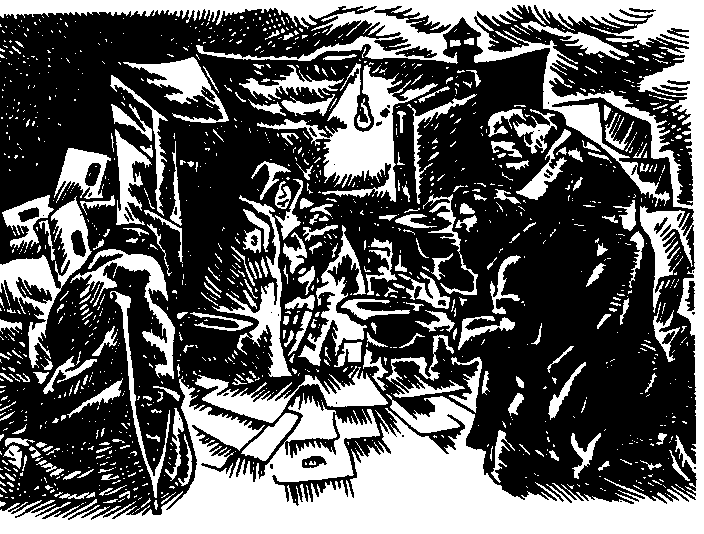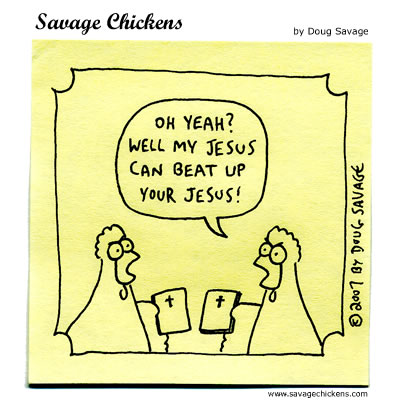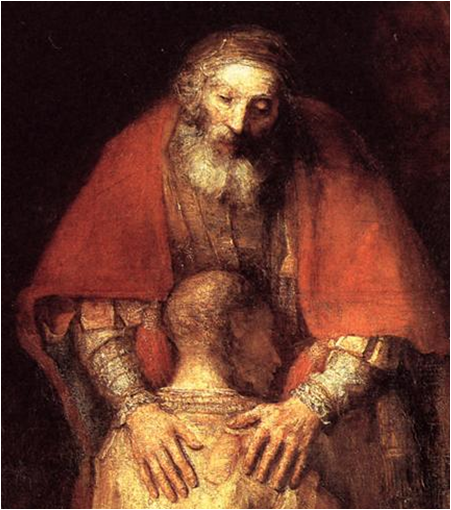 |
| Mary, Joseph and Jesus, known by Joseph's family as the Unholy Trinity: "slut, wimp and bastard" |
1. An adulterous wife
Mary, the mother of Jesus, received a great "blessing" of a pregnancy from God... the blessing of being accused of an unfaithful slut. She was already engaged to Joseph, a trade-worker, so when she shows up pregnant, it's clear that someone wasn't following the rules. Frankly, under the rules of first century Palestine, she could have been stoned to death. Her (soon to be) husband kept her from this fate because he was...
2. A mystical wimp
Joseph didn't want his fiancee killed, he just wanted her drama to go away. That is, until he got a dream about an angel. He didn't even get a face-to-face like his woman, he just had some spicy pizza and dreamed up an angel telling him to go ahead and marry the slut. He even told the wimp what to name the kid when he was born. He woke up and said, "Well, I know what to do now." Really, how many people take their nighttime fantasies as commands?
3. A Communist
Mary decided it was a great time to hang with her cousin in the country, and while she was there she was singing communist propaganda. She sang about revolution and the proletariat taking over. She also sang about communist deeds like feeding the hungry and taking possessions from the rich. She was a real party-goer, that Mary.
4. Judgmental family members
We know that Joseph had to go to Bethlehem. But he had to go there because that was his family home. He didn't try to go to an "inn" but to a "guest room" that his family home had for visitors. The room was "full", meaning they didn't have room for a socialist pregnant slut that their wimpy nephew decided to hook up with. They can go out into the stables.
 |
| "Now we know what the frankincense and myrrh was for." |
Shepherds, back in the day, didn't smell like mothballs or the back of a church closet. Rather, they smelled like sheep. Take a wool sweater, get it wet, roll it in some dirt and grass and then stick it in a box for a month. NOW you know what shepherd smells like. These "workers" just hung out with sheep, trying to find someone's lawn for the animals to chomp on. So everyone within a hundred miles of every flock (read: everyone) hated these wandering guys who liked sheep a bit too much. For some reason, the angels thought these were the guys who needed to see the great King pop out from a vagina.
6. Nasty Old Fanatics
When Jesus' parents brought him to the temple to have his foreskin ripped off his penis with an ancient "knife", two old people accosted them. First was Simeon who was "told by God" that he would see the Messiah before he died. Perhaps he knew the day was coming and just picked out a likely looking male baby and declared his allegiance to that slobbering, wetting-himself King. Then eighty four year old Anna "who never left the temple" to like eat, or anything saw Simeon fawning over the brat, so she had to have a piece of the spiritual action.
7. Slackers
Those "wise men" we hear about? They were actually astrolegers, who saw a sign in the stars about the king to be born. So they decided to pop over and see the king. Only problem? They lives in Persia, and cars weren't to be invented for a couple thousand years. So they hoofed it, not having anything better to do, which took them a couple years, so the kid wasn't a baby anymore, but a toddler. Meanwhile, they got the attention of the local king (read: serial murderer). and gave him the kid's whereabouts. Then the bums scooted out of time before the genocide began. If it wasn't for another vision of the wimp, the toddler king would have bit the big one.
The whole point is this: the King of Jerusalem, the Teacher of Love, the Jewish Emperor of Heaven, the Son of God... or the Nazarene Bastard, whatever you want to call him... seemed to have a habit even before birth to hang out with people who had less-than-pristine reputations. Maybe he wanted to have a community made up of the same, you think? Perhaps he picked up his mother's communist tendencies?












